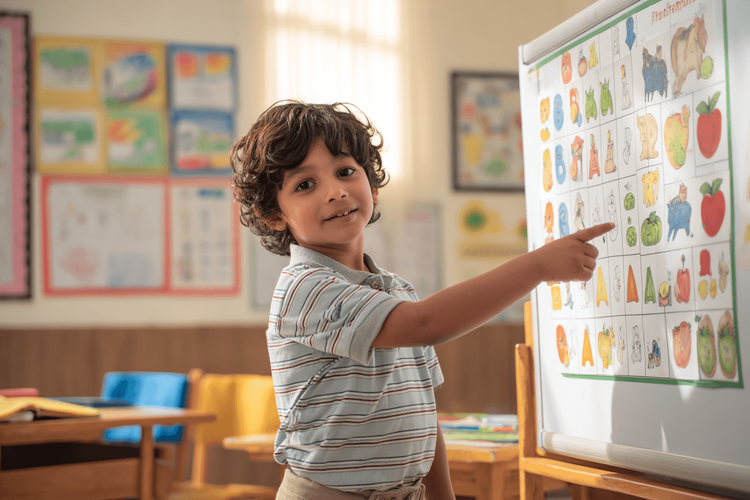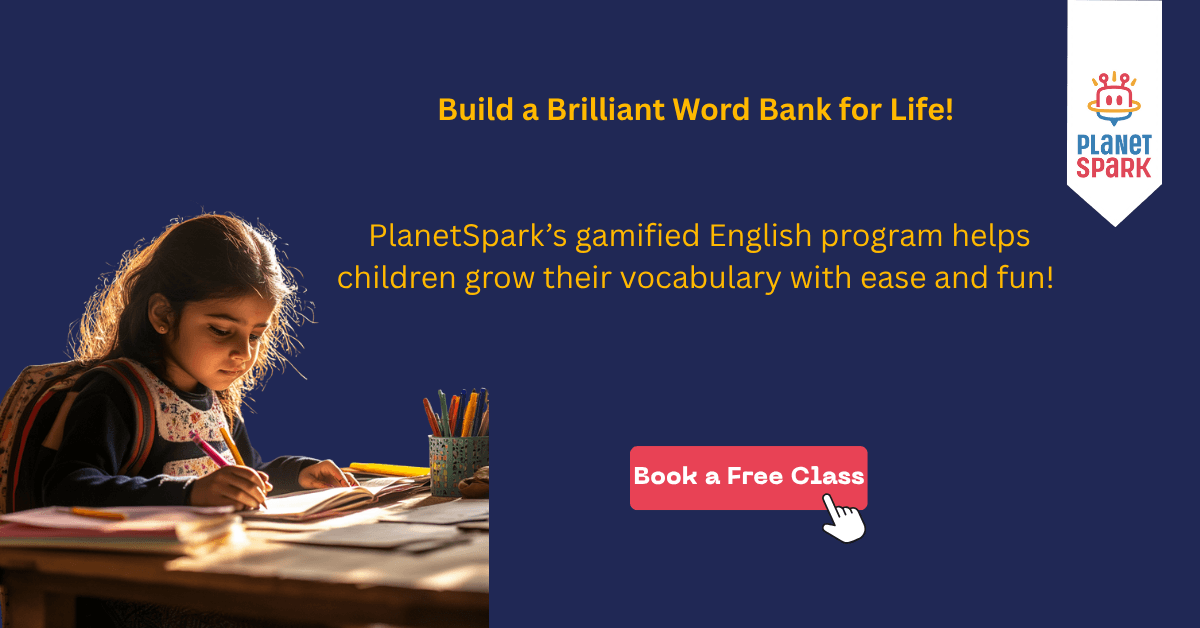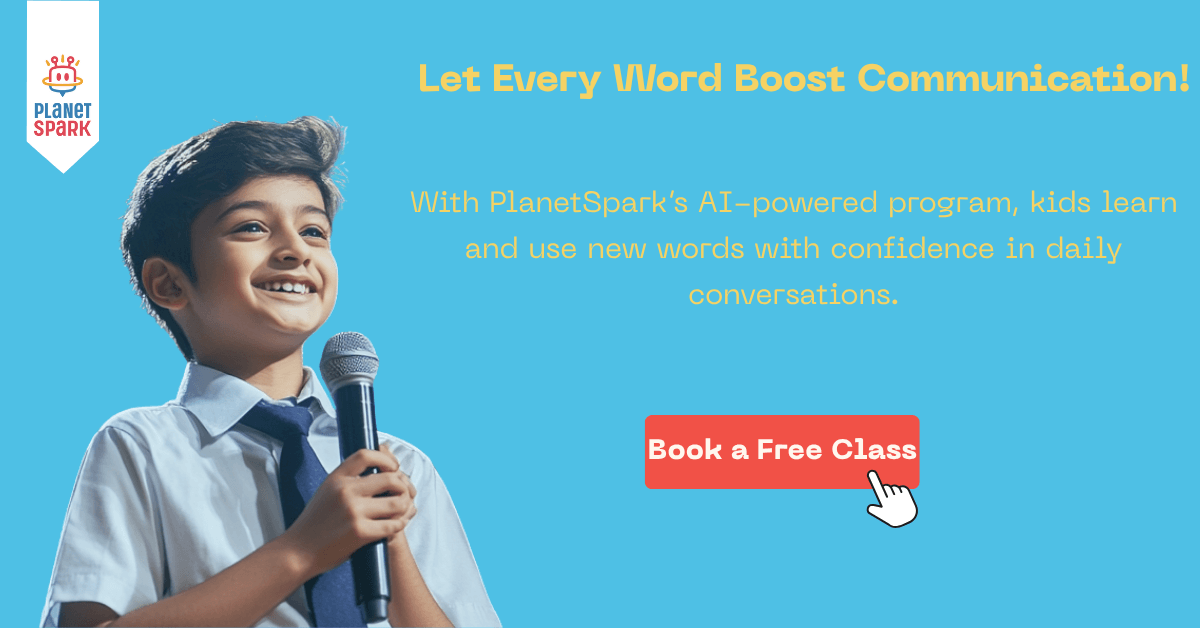Basic English Words for Kids: Class-Wise Vocabulary Guide
Last Updated At: 22 Jul 2025
10 min read

Table of Contents
- Why Vocabulary Matters for Kids
- Class-Wise English Vocabulary Charts for Kids
- Thematic Vocabulary for All Ages
- How to Help Kids Build Vocabulary Easily
- Fun Vocabulary-Building Games for Kids
- Tips for Teaching Basic Words to Young Learners
- Role of Digital Tools in Vocabulary Building
- Sample Daily Vocabulary Routine (for Parents & Teachers)
- Help Your Child Master Vocabulary with PlanetSpark
- Final Thoughts
- FAQs: Basic English Words for Kids
Building a strong foundation in English starts with learning the right words. For children, understanding basic English words is the first step toward becoming confident communicators and successful learners. Whether your child is just starting school or already picking up sentences, a rich vocabulary improves reading skills, writing, spelling, and pronunciation. In this blog, we present a comprehensive, class-wise guide to basic English words for kids, fun learning methods, vocabulary games, and practical tips to help your child flourish, powered by PlanetSpark’s expert English programs.
Why Vocabulary Matters for Kids
Vocabulary is the gateway to comprehension and self-expression. When children understand a wide range of words:
They can follow classroom instructions better.
They express thoughts clearly in speech and writing.
They develop stronger reading and comprehension skills.
They perform better in storytelling, spelling bees, and exams.
Vocabulary is also linked to emotional intelligence, children with good word banks can label emotions, describe problems, and build positive relationships.

Class-Wise English Vocabulary Charts for Kids
✦ Pre-Primary (Nursery–KG): First 100 Words
At this level, children need to recognize words they encounter in everyday life. Focus is on visual and sound association.
| Category | Examples |
|---|---|
| Colors | red, blue, yellow, green, pink |
| Shapes | circle, square, triangle, star |
| Animals | dog, cat, cow, lion, elephant |
| Fruits | apple, mango, banana, orange, grapes |
| Actions | eat, run, jump, sleep, walk |
| Family Members | mom, dad, sister, brother, baby |
| School Objects | bag, book, pen, chair, table |
| Body Parts | eyes, ears, nose, mouth, hands |
Goal: Identify and say these words confidently with correct pronunciation
✦ Class 1–2: Foundational Vocabulary (High-Frequency Words)
Children in this age group start reading short sentences. Words should be familiar, phonetically simple, and frequently used in stories and communication.
| Category | Examples |
|---|---|
| Sight Words | the, is, are, am, this, that, it, here, come, go |
| Nature | sun, moon, sky, tree, cloud, rain |
| Actions | jump, laugh, cry, play, read, write, sing |
| Describing Words | big, small, tall, happy, sad, hot, cold |
| Household | bed, cup, door, spoon, fan, light |
| Emotions | happy, angry, scared, sleepy, excited |
Goal: Read, spell, and use these words in short oral and written sentences.

Want to test your child’s understanding of homophones?
Download our FREE, expertly designed Class 3 Vocabulary Worksheet on Homophones and make learning fun and practical!
✦ Class 3–4: Functional Vocabulary for Speaking & Writing
At this stage, kids begin writing paragraphs and short compositions. Vocabulary should support grammar, sentence building, and self-expression.
| Category | Examples |
|---|---|
| Adjectives | soft, hard, kind, noisy, clean, dirty |
| Verbs | swim, climb, draw, think, talk, bake |
| School Vocabulary | recess, homework, eraser, notebook, classroom |
| Time & Days | today, tomorrow, yesterday, Monday, morning, evening |
| Opposites | fast–slow, in–out, up–down, open–close, full–empty |
| Places | park, zoo, hospital, market, playground |
Goal: Use words in basic conversations, diary writing, and storytelling exercises.
✦ Class 5–6: Intermediate Vocabulary for Fluency
Children here are transitioning into fluent communication. Vocabulary includes more abstract and academic words.
| Category | Examples |
|---|---|
| Emotions & Feelings | nervous, confident, jealous, curious, cheerful |
| Academic Subjects | science, history, geography, multiplication, experiment, ruler |
| Technology Words | computer, keyboard, mouse, screen, internet |
| Social & Moral Words | honest, brave, polite, fair, helpful, teamwork |
| Environment | pollution, planet, recycle, conserve, habitat |
| Verbs (Advanced) | discover, decide, compare, explain, suggest |
Goal: Apply words in essays, dialogues, school debates, and comprehension passages.
Thematic Vocabulary for All Ages
Introducing vocabulary through themes helps kids connect words to real-life experiences. Here are common themes with examples:
| Theme | Vocabulary |
|---|---|
| Food | rice, milk, bread, butter, sandwich, juice |
| Clothes | shirt, pants, socks, shoes, cap, sweater |
| Travel | bus, car, train, ticket, map, station |
| Festivals | Diwali, Christmas, Holi, sweets, lights, gift |
| Weather | sunny, cloudy, rainy, stormy, windy, hot, cold |
| Animals | domestic, wild, aquatic, pet, mammal, bird, insect |
Use tip: Create flashcards or posters on these themes and use them during role-play or daily conversations.
How to Help Kids Build Vocabulary Easily
Here are effective ways parents and teachers can nurture a love for learning new words:
1. Use Everyday Conversations
Talk to your child using a rich mix of words. Describe what you're doing: "Let’s slice the juicy mango" or "The sky looks cloudy today."
2. Read Aloud Daily
Read storybooks together. Pause to ask, “Do you know what this word means?” Use picture dictionaries and comic books.
3. Introduce a Word of the Day
Pick a new word each morning. Use it 3–4 times in the day in different sentences. Create a “word wall” at home.
4. Practice with Worksheets
Use age-appropriate phonics, word search, matching, and fill-in-the-blank worksheets to reinforce vocabulary.
5. Label the Environment
Label household items like door, fridge, mirror, or switchboard. In classrooms, label windows, corners, charts, etc.
Fun Vocabulary-Building Games for Kids
Learning becomes effortless when it feels like play. Try these games:
1. Pictionary
Draw pictures of vocabulary words and let the child guess. Great for visual learning!
2. Word Bingo
Make bingo cards with basic English words. Call out words and let kids mark them.
3. I Spy
Say, “I spy something that starts with the letter T,” and let the child guess the object.
4. Charades
Act out an action word like "sleep" or "dance" without speaking. Kids guess the word.
5. Vocabulary Treasure Hunt
Hide word flashcards around the house. Give clues based on word meanings.
6. Matching Games
Match words to pictures, synonyms, or opposites. Helps retention through repetition.
Tips for Teaching Basic Words to Young Learners
Start with nouns – These are easiest to relate to, especially concrete things like toys, animals, and food.
Speak slowly and clearly – Kids need time to grasp pronunciation.
Repeat often – Repetition improves recall and confidence.
Make it multi-sensory – Use visuals, sounds, actions, and touch wherever possible.
Celebrate progress – Praise children when they use new words correctly in speech or writing.
Role of Digital Tools in Vocabulary Building
In today’s tech-savvy world, vocabulary apps, interactive videos, and virtual classrooms make learning engaging and measurable.
How PlanetSpark Helps:
Live Interactive Classes where kids practice speaking with real-time feedback.
AI Fluency Reports to measure pronunciation and word usage accuracy.
Creative Writing Modules that help children use vocabulary in stories, poems, and journals.
Gamified Learning keeps kids engaged and motivated.
Personalized Vocabulary Tracker to track progress and customize learning.

Sample Daily Vocabulary Routine (for Parents & Teachers)
A consistent daily routine is key to building strong vocabulary skills in children. Whether you're a parent or a teacher, incorporating vocabulary learning into your child’s everyday schedule will make the process both engaging and effective. Here's a detailed routine you can follow or customize based on the age and class level of your child.
Vocabulary Boost (10–15 minutes)
Goal: Kickstart the day with new words.
Activities:
Word of the Day: Introduce one age-appropriate word. Write it on a sticky note or whiteboard.
Example (Class 1): “Jump” – Meaning: to push yourself off the ground.
Example (Class 4): “Describe” – Meaning: to tell about something in detail.
Say It Aloud: Let the child repeat the word 3–4 times to reinforce pronunciation.
Use It in a Sentence: Ask your child to form one simple sentence using the new word.
Example: “I jump on the bed.” or “Can you describe your toy?”
Visual Connect: Show a picture or draw the word. Visuals enhance memory.
Mid-Morning Practice (10 minutes)
Goal: Reinforce through interactive recall.
Activities:
Flashcard Quick Drill: Show flashcards of 5–10 previously learned words. Let your child read, spell, or act them out.
Mini Vocabulary Game: Use games like:
“Odd One Out” (Identify the word that doesn’t belong)
“Word Match” (Match word with picture)
“Rhyming Words” (Find rhyming pairs from the list)
Mini Writing Prompt: Give them a short prompt and ask them to write 1–2 lines using the new word.
Prompt: “My favorite animal is ___ because…”
Lunch Talk Vocabulary (5 minutes)
Goal: Include language during informal conversations.
Activities:
Conversation Challenge: Pick 1–2 vocabulary words and challenge your child to use them during lunchtime.
Guess the Word: Give them the meaning or a sentence and ask them to guess the word.
Example: “I’m thinking of a word that means ‘very big.’” (Answer: Huge)
Afternoon Revision & Application (10–15 minutes)
Goal: Encourage use of vocabulary in different contexts.
Activities:
Story Time: Read a short story aloud. Pause to highlight and explain unfamiliar words.
Fill in the Blank: Create simple sentences with missing words and let the child fill them in.
Example: “The cat is ____ the table.” (Answer: under)
Art & Vocabulary Fusion: Ask your child to draw something related to the word and label it.
🌟 Want to make this routine more engaging with expert help? Join PlanetSpark's live English classes where vocabulary is taught through games, AI feedback, and fun conversations!
🔗 Book Your Free Trial Now
Evening Word Play (10 minutes)
Goal: End the day with relaxed word learning.
Activities:
Online Vocabulary Games: Use age-appropriate, screen-time limited apps or websites.
PlanetSpark’s interactive classes and AI tools offer engaging vocabulary practice through games and dialogue sessions.
Charades with Words: Act out a word and ask your child to guess it or vice versa.
Word Journal Entry: Let the child write 2–3 new words they learned today, with meanings and drawings.
Before Bed Word Review (5 minutes)
Goal: Reinforce retention through quiet reflection.
Activities:
Bedtime Recap: Ask, “What new word did you learn today?”
Tell Me a Word: Encourage your child to recall and use any word from the week in a new sentence.
Weekly Tips to Support the Routine
Review weekly: Every Sunday, revise all new words learned during the week.
Reward effort: Stickers, stars, or small praises go a long way in motivating children.
Make it visible: Use a “Word Wall” in your study area with flashcards, pictures, or sticky notes.
Involve the family: Make it a game where siblings or parents join in.
Help Your Child Master Vocabulary with PlanetSpark
Want your child to build vocabulary faster and speak English fluently?
🌟 Join PlanetSpark’s English Communication Course!
Your child will:
✅ Learn 1000+ new words through fun activities
✅ Improve public speaking and writing skills
✅ Get personal feedback from expert teachers
👉 Book a Free Trial Class Today!
Final Thoughts
A good vocabulary is not just about knowing more words, it’s about using them meaningfully. Start with simple, everyday English words and gradually build up through reading, talking, and playing. The earlier you start, the easier it becomes.
With the right approach, tools, and encouragement, your child can grow into a confident, fluent English speaker ready to take on any classroom, competition, or conversation.
FAQs: Basic English Words for Kids
Q1. What are some fun ways to teach vocabulary to young kids?
Flashcards, games like “Simon Says,” rhyming songs, and picture books are effective and engaging.
Q2. How many basic English words should a 6-year-old know?
On average, a 6-year-old should recognize and use about 1,000 to 1,500 words.
Q3. Can I teach my child English at home without a tutor?
Yes, with structured tools like storybooks, educational games, and support platforms like PlanetSpark, parents can teach vocabulary at home.
Q4. Why is PlanetSpark recommended for vocabulary building?
PlanetSpark combines live teacher-led classes, gamified learning, and practical usage; ideal for improving a child’s vocabulary and fluency.
Q5. How do I know if my child is improving in vocabulary?
Track their ability to use new words in conversations, stories, or sentences. PlanetSpark also provides regular progress reports.
Personalized Communication Report
Record a video to get a AI generated personalized communication report for your child
Select Learner's Class

Hi There, want to try these
tips for your child with
LIVE with our expert coach?
Let's check your child's
English fluency
